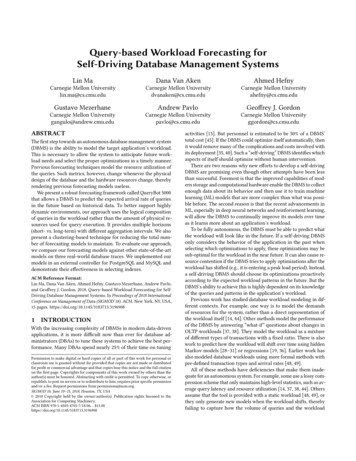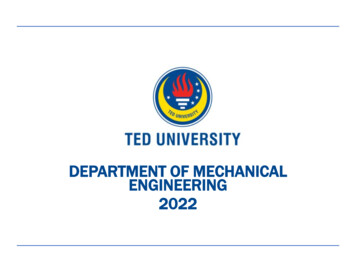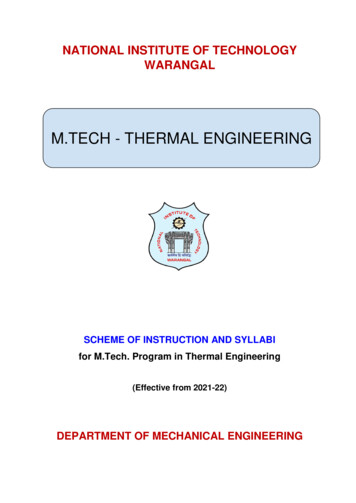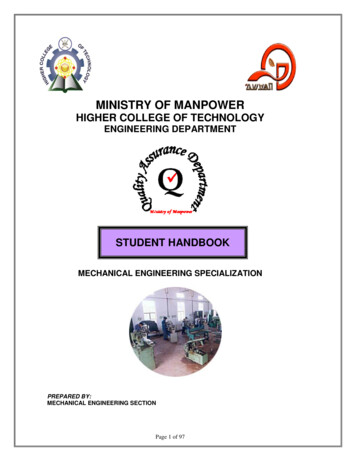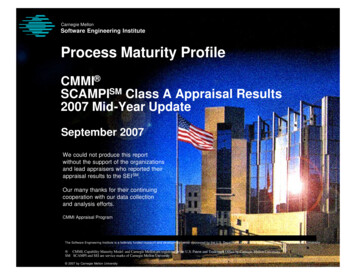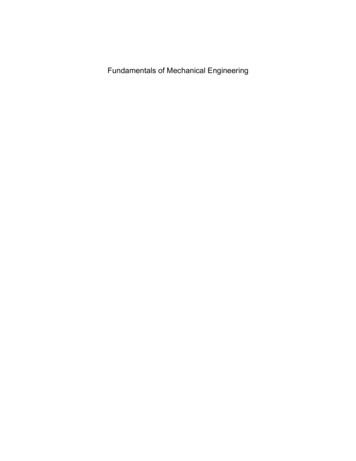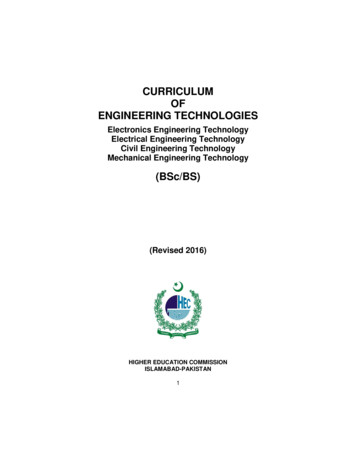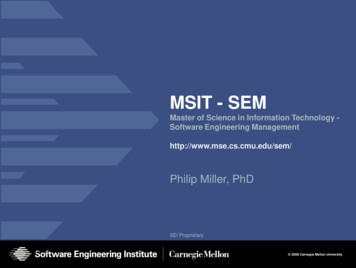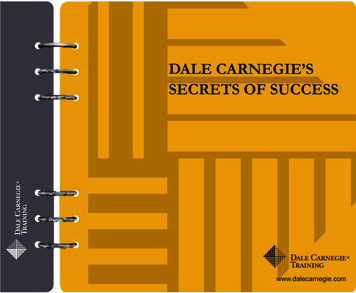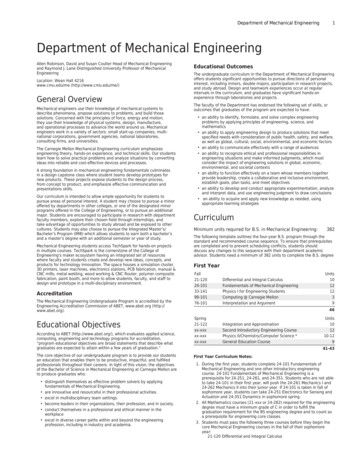
Transcription
Department of Mechanical Engineering1Department of Mechanical EngineeringAllen Robinson, David and Susan Coulter Head of Mechanical Engineeringand Raymond J. Lane Distinguished University Professor of MechanicalEngineeringLocation: Wean Hall 4216www.cmu.edu/me (http://www.cmu.edu/me/)General OverviewMechanical engineers use their knowledge of mechanical systems todescribe phenomena, propose solutions to problems, and build thosesolutions. Concerned with the principles of force, energy and motion,they use their knowledge of physical systems, design, manufacture,and operational processes to advance the world around us. Mechanicalengineers work in a variety of sectors: small start-up companies, multinational corporations, government agencies, national laboratories,consulting firms, and universities.The Carnegie Mellon Mechanical Engineering curriculum emphasizesengineering theory, hands-on experience, and technical skills. Our studentslearn how to solve practical problems and analyze situations by convertingideas into reliable and cost-effective devices and processes.A strong foundation in mechanical engineering fundamentals culminatesin a design capstone class where student teams develop prototypes fornew products. These projects expose students to the design process,from concept to product, and emphasize effective communication andpresentations skills.Educational OutcomesThe undergraduate curriculum in the Department of Mechanical Engineeringoffers students significant opportunities to pursue directions of personalinterest, including minors, double majors, participation in research projects,and study abroad. Design and teamwork experiences occur at regularintervals in the curriculum, and graduates have significant hands-onexperience through laboratories and projects.The faculty of the Department has endorsed the following set of skills, oroutcomes that graduates of the program are expected to have: an ability to identify, formulate, and solve complex engineeringproblems by applying principles of engineering, science, andmathematics an ability to apply engineering design to produce solutions that meetspecified needs with consideration of public health, safety, and welfare,as well as global, cultural, social, environmental, and economic factors an ability to communicate effectively with a range of audiences an ability to recognize ethical and professional responsibilities inengineering situations and make informed judgments, which mustconsider the impact of engineering solutions in global, economic,environmental, and societal contexts an ability to function effectively on a team whose members togetherprovide leadership, create a collaborative and inclusive environment,establish goals, plan tasks, and meet objectives an ability to develop and conduct appropriate experimentation, analyzeand interpret data, and use engineering judgment to draw conclusions an ability to acquire and apply new knowledge as needed, usingappropriate learning strategiesOur curriculum is intended to allow ample opportunity for students topursue areas of personal interest. A student may choose to pursue a minoroffered by departments in other colleges, or one of the designated minorprograms offered in the College of Engineering, or to pursue an additionalmajor. Students are encouraged to participate in research with departmentfaculty members, explore their chosen field through internships, andtake advantage of opportunities to study abroad and be exposed to othercultures. Students may also choose to pursue the Integrated Master’s/Bachelor’s Program (IMB) which allows students to earn both a bachelor’sand a master’s degree with an additional semester or year of study.CurriculumMechanical Engineering students access TechSpark for hands-on projectsin multiple courses. TechSpark is the cornerstone of the College ofEngineering's maker ecosystem having an integrated set of resourceswhere faculty and students create and develop new ideas, concepts, andproducts for technology innovation. The space houses a simulation cluster,3D printers, laser machines, electronics stations, PCB fabrication, manual &CNC mills, metal welding, wood working & CNC Router, polymer compositefabrication, paint booth, and more to allow students, faculty, and staff todesign and prototype in a multi-disciplinary environment.First YearAccreditationThe Mechanical Engineering Undergraduate Program is accredited by theEngineering Accreditation Commission of ABET, www.abet.org (http://www.abet.org).Educational ObjectivesAccording to ABET (http://www.abet.org/), which evaluates applied science,computing, engineering and technology programs for accreditation,“program educational objectives are broad statements that describe whatgraduates are expected to attain within a few years of graduation.”The core objective of our undergraduate program is to provide our studentsan education that enables them to be productive, impactful, and fulfilledprofessionals throughout their careers. In light of this vision, the objectivesof the Bachelor of Science in Mechanical Engineering at Carnegie Mellon areto produce graduates who: distinguish themselves as effective problem solvers by applyingfundamentals of Mechanical Engineering. are innovative and resourceful in their professional activities. excel in multidisciplinary team settings. become leaders in their organizations, their profession, and in society. conduct themselves in a professional and ethical manner in theworkplace excel in diverse career paths within and beyond the engineeringprofession, including in industry and academia.Minimum units required for B.S. in Mechanical Engineering:382The following template outlines the four-year B.S. program through thestandard and recommended course sequence. To ensure that prerequisitesare completed and to prevent scheduling conflicts, students shoulddiscuss any changes to this sequence with their department academicadvisor. Students need a minimum of 382 units to complete the B.S. al and Integral CalculusFundamentals of Mechanical EngineeringPhysics I for Engineering StudentsComputing @ Carnegie MellonInterpretation and xxxIntegration and ApproximationSecond Introductory Engineering CoursePhysics II/Chemistry/Computer Science *General Education CourseUnits101210-12941-43First Year Curriculum Notes:1. During the first year, students complete 24-101 Fundamentals ofMechanical Engineering and one other introductory engineeringcourse. 24-101 Fundamentals of Mechanical Engineering is aprerequisite for 24-251, 24-261, and 24-351. Students who are not ableto take 24-101 in their first year, will push the 24-261 Mechanics I and24-262 Mechanics II into their junior year. If 24-101 is taken in fall ofsophomore year, students can take 24-251 Electronics for Sensing andActuation and 24-351 Dynamics in sophomore spring.2. All Mathematics courses (21-xxx or 24-282) required for the engineeringdegree must have a minimum grade of C in order to fulfill thegraduation requirement for the BS engineering degree and to count asa prerequisite for engineering core classes.3. Students must pass the following three courses before they begin thecore Mechanical Engineering courses in the fall of their sophomoreyear:21-120 Differential and Integral Calculus
2Department of Mechanical Engineering21-122 Integration and Approximation39-310Experiential Learning IIISophomore YearFall24-22124-26121-254or amics9Mechanics I: 2D Design (new course - see10description below)Linear Algebra and Vector Calculus for Engineers11Special Topics: Linear Algebra and Vector Calculus forEngineers24-200 Machine Shop OR 24-251 Electronics1-3for Sensing and Actuation (new course - seedescription below) **Physics II/Chemistry/Computer Science *10-12Lab requirement ***General Education Course9Experiential Learning x-xxx39-220Differential EquationsFluid MechanicsMechanics 2: 3D Design (new course - seedescription below)24-200 Machine Shop OR 24-251 Electronicsfor Sensing and Actuation (new course - seedescription below) **Physics II/Chemistry/Computer Science *Lab requirement ***General Education CourseExperiential Learning IIUnits910101-310-129049-53*Physics II/Chemistry/Computer Science:First year students are encouraged to prioritize completing Physics IIand Chemistry requirement over programming in the first year. The recommended Physics sequence is 33-141 (http://coursecatalog.web.cmu.edu/search/?P 33-141) / 33-142 (http://coursecatalog.web.cmu.edu/search/?P 33-142) for engineeringstudents, however, 33-151 (http://coursecatalog.web.cmu.edu/search/?P 33-151) / 33-152 (http://coursecatalog.web.cmu.edu/search/?P 33-152) willalso meet the CIT Physics requirement. The Chemistry requirement can be filled with 09-105 Introduction to ModernChemistry I or 09-111 Nanolegos: Chemical Building Blocks. The programming requirement can be filled with 15-110 Principles ofComputing or 15-112 Fundamentals of Programming and Computer Science.*****Machine Shop/Electronics for Sensing and Actuation: Machine shop 24-200 Maker Series: Intro to Manual Machining and 24-251Electronics for Sensing and Actuation should be completed in sophomore year.Lab Requirement: Mechanical engineering undergraduates must satisfy a Science Laboratoryrequirement to graduate. The lab requirement may be fulfilled with one of thefollowing courses:03-12409-10133-10033-10442-203Modern Biology LaboratoryIntroduction to Experimental ChemistryBasic Experimental PhysicsExperimental PhysicsBiomedical Engineering Laboratory93699Junior YearFall24-32224-351Heat TransferDynamics(Offered Fall and Spring)24-370Mechanical Design: Methods and Applications(new course - see description below)xx-xxxEngineering Statistics RequirementStudents are required to complete an engineering statisticscourse. The department strongly encourages 19-250 SpecialTopics: Statistical Models for Engineering Analysis and Designor 36-225 Introduction to Probability Theory. 36-219 ProbabilityTheory and Random Processes or 36-220 Engineering Statisticsand Quality Control will also fulfill the requirement.xx-xxxGeneral Education Course05033-141 Physics I for Engineering StudentsUnits10101299Spring24-302Mechanical Engineering Seminar IThe presentation skills requirement can be satisfied bycompleting one of the following options: 24-302 MechanicalEngineering Seminar I, 76-270 Writing for the Professions,70-340 Business Communications, or 39-402 LeadershipDevelopment Seminar.24-311Numerical Methods24-321Thermal-Fluids Experimentation24-352Dynamic Systems and Controls(Offered Fall and Spring)xx-xxxGeneral Education CourseUnits2101212945Senior YearFall24-441or 24-67124-452xx-xxxxx-xxxxx-xxxEngineering Design II: Conceptualization and****RealizationElectromechanical Systems DesignMechanical Systems Experimentation(Offered Fall and Spring)ElectiveElectiveGeneral Education CourseUnits12999948Spring24-441or 24-671or 24-63124-xxxxx-xxxxx-xxxxx-xxxEngineering Design II: Conceptualization and****RealizationElectromechanical Systems DesignThermal DesignMechanical Engineering Technical ElectiveGeneral Education CourseElectiveElectiveUnits129-1299948-51**** Capstone Courses: To fulfill your capstone requirement, you can complete 24-441 EngineeringDesign II: Conceptualization and Realization (FALL OR SPRING), 24-671Electromechanical Systems Design (FALL OR SPRING), or 24-631 ThermalDesign (SPRING ONLY) Capstone course can be taken either Fall or Spring of senior year, with theexception of 24-631 Thermal Design (SPRING ONLY) BME and Robotics Double Majors may use the capstone for their double majorinstead of the above listed MechE capstone classes
Department of Mechanical Engineering‡New Course Descriptions24-251 Electronics for Sensing and ActuationMechanical engineers design, build, and troubleshoot basic circuitsthat perform signal conditioning on sensor measurements and providepower amplification for actuation. This course covers the basics ofpassive circuit design, applications of operational amplifiers, andthe use of transistors to amplify low power signals coming frommicrocontrollers. Lecture materials are coupled with hands-on in-classexercises and homework assignments using the Arduino to interfacewith sensors and actuators.24-261 Mechanics I: 2D DesignThis is the first course in a three-semester sequence that integratesthe principles of mechanics with hands-on projects that have studentsapply those principles in a design context. In the first semester,students review and extend methods of 2D statics to study single andmultiple bodies, such as structures and machines. Internal loads in2D are defined and quantified, followed by a study of stresses andstrains under axial loading, bending and shear. Students will also learnengineering design process methods and skills, including conceptdesign, detailed design, analysis, fabrication, and testing. As topicsare introduced and applied by students in hands-on assignments, theywill compare theoretical computations and experimental testing oftheir design ideas, so as to reinforce fundamentals and practice theengineering design process.24-262 Mechanics II: 3D DesignThis is the second course in a three-semester sequence that integratesthe principles of mechanics with hands-on projects that have studentsapply those principles in a design context. In the second semester,students extend their foundation in 2D statics to the analysis of3D engineering systems, including determination of reactions atconnections and internal loads. Friction, shear stress, and shear strainare introduced, followed by a study of stresses and deformation intorsion. Multiaxial stresses, such as those occurring in combinationsof torsion and bending or in pressure vessels, are studied. Stresstransformations are introduced, as well as the formulation of simplefailure criteria. Students will expand their engineering design skillsthrough team-based hands-on and computational projects that utilizestress and failure analysis of 3D engineered systems. In addition,students will learn elementary aspects of machine design and catalogselection to support projects. Altogether, students will learn to expressideas in sketches, interpret and create engineering drawings, modeldetailed shapes with CAD tools, analyze product performance with CAEtools, choose materials and manufacturing schemes, and create andtest prototypes.24-370 Mechanical Design: Methods and ApplicationsThis is the third course in a three-semester sequence that integratesthe principles of mechanics with hands-on projects that have studentsapply those principles in a design context. Building on the principlesand design methodology introduced in the first two courses, this courseconsists of a detailed study of typical loading conditions and resultingstresses and deflections in commonly used machine elements, suchas shafts, gears, power screws, fasteners, brakes/couplings, flywheels,and bearings, and best practices in their design and application.Machine design against static and dynamic failure will be consideredwith focus on the effect of material properties, manufacturability, andcost considerations. Students will also learn the connections betweentheory and analytical methods, available computational tools, and fielddesign. Learning objectives will be assessed through homework, classexams, and the conduct of the group projects.Mechanical Engineering Technical ElectivesStudents must take at least one approved non-core Mechanical Engineeringcourse labeled as “Mechanical Engineering Technical Elective” in theexample course sequence. The course must be an approved 24-xxxcourse (9-unit minimum) at the 300 level or above to fulfill the technicalelective requirement. 24-291 Environmental Systems on a ChangingPlanet and 24-292 Renewable Energy Engineering are the only 200 levelcourses that may be used as a Mechanical Engineering Technical Elective.Students can also take mechanical engineering graduate courses to fulfillthe technical elective requirement. However, students must have theappropriate prerequisites and the instructor must approve taking thecourse. Undergraduates do not have priority for graduate level courses.Students can find a list of graduate courses we offer on the Carnegie MellonSchedule of Classes rse offerings are variable, please check the Schedule of Classes (above)to see the most current list of classes.Students cannot use research or project courses to fulfill the technicalelective requirement. However, these courses, with limitations, will countas free elective units. Up to 27 units of project/research may be counted in3the free electives. Project/research courses that do not fulfill the technicalelective requirements are: 24-391/ 24-392 Mechanical Engineering Project 24-491/ 24-492 Department Research Honors 39-xxx CIT series coursesFree ElectivesA Free Elective is defined as any graded course offered by any academicunit of the university (including research institutes such as the RoboticsInstitute (http://www.ri.cmu.edu/) and the Software Engineering Institute(http://www.sei.cmu.edu/)). Free electives offer students the opportunityto add additional majors and minors, pursue additional interests or deepentheir experience in Mechanical Engineering. Typically, once the corerequirements are completed, there remain about 45 units of free electivesto reach the minimum of 382 to complete the degree.Up to 9 units of Student Taught Courses (StuCO) and Physical Educationcourses, or other courses taken as Pass/Fail, may also be used toward FreeElectives.Guidance on Engineering ElectivesThe Mechanical Engineering department offers several elective coursesfor undergraduates seeking further knowledge and experience in specialtyareas of mechanical engineering. These courses (with approval) can fulfillfor your Mechanical Engineering Technical Elective, Free Electives, and/oradditional major or minor requirements.Robotics and AutomationFundamental Courses24-356Introduction to Vibrations with Applications24-451Feedback Control Systems24-677Special Topics: Linear Control Systems24-760Special Topics: Robot Dynamics and Analysis24-773Multivariable Linear Control24-776Non Linear ControlApplication Courses24-614Microelectromechanical Systems24-671Electromechanical Systems Design24-673Soft Robots: Mechanics, Design and Modeling24-753Special Topics: Robotic Materials: Designs,Principles & Mechanics24-774Special Topics: Advanced Control SystemsIntegration24-775Special Topics: Robot Design andExperimentation24-778Mechatronic Design9121212121212121212121212Energy, Environment, and Thermal Fluid SystemsFundamental Courses24-711Fluid Dynamics24-718Computational Fluid Dynamics24-721Advanced Thermodynamics24-722Energy System Modeling24-730Advanced Heat TransferApplication Courses24-292Renewable Energy Engineering24-421Internal Combustion Engines24-425Combustion and Air Pollution Control24-428Computational Analysis of Transport Phenomena24-623Molecular Simulation of Materials24-626Air Quality Engineering24-628Energy Transport and Conversion at theNanoscale24-629Direct Solar and Thermal Energy Conversion24-631Thermal Design24-643Energy Storage Materials and Systems121212121291299121212121212Product Design and DevelopmentFundamental Courses24-651Material Selection for Mechanical Engineers12
4Department of Mechanical Engineering24-681Computer-Aided Design24-683Design for Manufacture and the EnvironmentApplication Courses24-632Special Topics: Additive ManufacturingProcessing and Product Development24-633Additive Manufacturing Laboratory24-672Special Topics in DIY Design and Fabrication24-680Quantitative Entrepreneurship: Analysis for NewTechnology Commercialization24-682Special Topics: Design for the Fourth IndustrialRevolution24-687Grand Challenge Innovation24-692Special Topics: Engineering a Startup: How toStart and Grow a Hardware Company121212121212121212Autonomous Systems and Machine LearningFundamental Courses24-451Feedback Control Systems24-480Special Topics: Artificial Intelligence and MachineLearning for Engineering24-677Special Topics: Linear Control Systems24-704Probability and Estimation Methods forEngineering Systems24-786Special Topics: Bayesian Machine Learning forScientists and Engineers24-787Machine Learning and Artificial Intelligence forEngineers24-789Special Topics: Deep Learning for EngineersApplication Courses24-774Special Topics: Advanced Control SystemsIntegration24-775Special Topics: Robot Design andExperimentation24-784Special Topics: Trustworthy AI Autonomy1291212121212121212Computational EngineeringFundamental Courses24-780Engineering Computation24-783Advanced Engineering Computation24-785Engineering OptimizationApplication Courses24-658Image-Based Computational Modeling andAnalysis24-681Computer-Aided Design24-718Computational Fluid Dynamics24-755Finite Elements in Mechanics I24-781Engineering Computation Project1212121212121212Quality Point Average RequirementsTo be eligible to graduate, undergraduate students must complete allcourse requirements for their program with a cumulative Quality PointPursuant to university rules, students can repeat a course in which a gradebelow C was attained in order to achieve the QPA requirement. When acourse is repeated, all grades will be recorded on the official academictranscript and will be calculated in the student's QPA. For all requiredMechanical Engineering core courses, the highest grade obtained betweenthe original and the repeated class will be used to calculate the MechanicalEngineering OPA.Credit Overload PolicyMechanical Engineering students can register for a maximum of 54units per semester. A student can request additional units from theUndergraduate Education Committee based on their QPA. The policy isoutlined in the Mechanical Engineering Undergraduate Handbook l).Double Majors and MinorsMechanical Engineering students may pursue double majors and minorsin a variety of subjects, taking advantage of the free elective courses tosatisfy the requirements for the major or minor. The College of Engineeringhas added designated minors to promote flexibility and diversity amongengineering students. Common double majors for Mechanical Engineeringstudents include Engineering and Public Policy, Biomedical Engineering andRobotics.A complete description of majors and minors in engineering can be found onthe College of Engineering website hips and Co-operativeEducation ProgramThe Mechanical Engineering Department considers experiential learningopportunities important educational options for its undergraduatestudents. Students in Mechanical Engineering are encouraged to undertakeprofessional internships during summer breaks.Another option is cooperative education, which provides a student with anextended period of exposure with a company. All co-ops must be at least 6consecutive months in length, and must be a full-time, paid position with asingle company.Study AbroadEngineering Mechanisms and MaterialsFundamental Courses24-634Structural Design24-635Structural Analysis24-652Mechanical Behavior of Engineering Materials24-653Special Topics: Materials and Their Processingfor Mechanical Engineers24-751Introduction to Solid Mechanics IApplication Courses24-643Energy Storage Materials and Systems24-650Applied Finite Element Analysis24-751Introduction to Solid Mechanics I24-684Special Topics: Nanoscale Manufacturing UsingStructural DNA Nanotechnology24-755Finite Elements in Mechanics I24-753Special Topics: Robotic Materials: Designs,Principles & MechanicsAverage of at least 2.00 for all courses taken. For undergraduate studentswho enrolled at Carnegie Mellon as freshmen and whose freshman gradescause the cumulative QPA to fall below 2.0, this requirement is modified tobe a cumulative QPA of at least 2.0 for all courses taken after the freshmanyear. Note, however, the cumulative QPA that appears on the student'sfinal transcript will be calculated based on all grades in all courses taken,including freshman year. The Mechanical Engineering Department requiresthat students attain a quality point average of 2.00 or higher for all requiredMechanical Engineering core courses.129121212121212121212In today’s global society, a study abroad experience can be an integralpart of an undergraduate engineering education. An academic experienceabroad is encouraged and assistance is provided for course choices andcurriculum sequencing. The Mechanical Engineering department offersscholarships for international experiences to support and encouragestudents to take advantage of study and work abroad experiences.Integrated Master's/Bachelor'sProgram (IMB)Interested undergraduates may plan a course of study that leads to both theBachelor's and Master's in Mechanical Engineering. Beyond eight semesters,at least one semester of full-time graduate student status is required.Please refer to the Integrated Master’s/Bachelor’s Degree Program sectionin the most recent Master of Science in Mechanical Engineering cation/graduate-programs/handbooks.html) for additional information.Full-Time FacultyAMIR BARATI FARIMANI, Assistant Professor of Mechanical Engineering –Ph.D., University of Illinois at Urbana-Champaign; Carnegie Mellon, 2018–
Department of Mechanical EngineeringMARK BEDILLION, Teaching Professor of Mechanical Engineering – Ph.D.,Carnegie Mellon University; Carnegie Mellon, 2016–RYAN SULLIVAN, Professor of Mechanical Engineering – Ph.D., University ofCalifornia at San Diego; Carnegie Mellon, 2012–SARAH BERGBREITER, Professor of Mechanical Engineering – Ph.D.,University of California at Berkeley; Carnegie Mellon, 2018–REBECCA TAYLOR, Assistant Professor of Mechanical Engineering – Ph.D.,Stanford University; Carnegie Mellon, 2016–JACK LEE BEUTH, Professor of Mechanical Engineering – Ph.D., HarvardUniversity; Carnegie Mellon, 1992–CONRAD TUCKER, Arthur Hamerschlag Career Development Professor ofMechanical Engineering – Ph.D., University of Illinois at Urbana-Champaign;Carnegie Mellon, 2019–JONATHAN CAGAN, George Tallman and Florence Barrett Ladd Professor ofEngineering – Ph.D., University of California at Berkeley; Carnegie Mellon,1990–5VENKAT VISWANATHAN, Associate Professor of Mechanical Engineering –Ph.D., Stanford University; Carnegie Mellon, 2014–MAARTEN P. DE BOER, Professor of Mechanical Engineering – Ph.D.,University of Minnesota; Carnegie Mellon, 2007–DOUGLAS WEBER, Akhtar and Bhutta Professor of Mechanical Engineering –Ph.D., Arizona State University; Carnegie Mellon, 2020–NESTOR GOMEZ, Special Faculty of Mechanical Engineering – Ph.D.,Carnegie Mellon University; Carnegie Mellon, 2018–VICTORIA WEBSTER-WOOD, Assistant Professor of Mechanical Engineering –Ph.D., Case Western Reserve University; Carnegie Mellon, 2018–NOELIA GRANDE GUTIERREZ, Assistant Professor of Mechanical Engineering– Ph.D. , Stanford University; Carnegie Mellon, 2021–KATE S. WHITEFOOT, Associate Professor of Mechanical Engineering – Ph.D.,University of Michigan; Carnegie Mellon, 2016–DIANA HAIDAR, Assistant Teaching Professor of Mechanical Engineering –Ph.D., University of Delaware; Carnegie Mellon, 2017–JESSICA ZHANG, George Tallman Ladd and Florence Barrett Ladd Professorof Mechanical Engineering – Ph.D., University of Texas at Austin; CarnegieMellon, 2007–ENI HALILAJ, Assistant Professor of Mechanical Engineering – Ph.D., BrownUniversity; Carnegie Mellon, 2018–B. REEJA JAYAN, Associate Professor of Mechanical Engineering – Ph.D.,University of Texas at Austin; Carnegie Mellon, 2015–AARON M. JOHNSON, Assistant Professor of Mechanical Engineering – Ph.D.,University of Pennsylvania; Carnegie Mellon, 2016–LEVENT BURAK KARA, Professor of Mechanical Engineering – Ph.D., CarnegieMellon University; Carnegie Mellon, 2007–PHILIP R. LEDUC, William J. Brown Professor of Mechanical Engineering –Ph.D., The Johns Hopkins University; Carnegie Mellon, 2002–DING ZHAO, Assistant Professor of Mechanical Engineering – Ph.D.,University of Michigan; Carnegie Mellon, 2018–EmeritiADNAN AKAY, Lord Emeritus Professor of Mechanical Engineering – Ph.D.,North Carolina State University; Carnegie Mellon, 1992–NORMAN CHIGIER, Emeritus Professor of Mechanical Engineering – Sc.D.,University of Cambridge; Carnegie Mellon, 1981–SHAWN LITSTER, Professor of Mechanical Engineering – Ph.D., StanfordUniversity; Carnegie Mellon, 2008–JERRY HOWARD GRIFFIN, William J. Brown Emeritus Professor of MechanicalEngineering – Ph.D., California Institute of Technology; Carnegie Mellon,1981–CARMEL MAJIDI, Clarence H. Adamson Professor of Mechanical Engineering –Ph.D., University of California at Berkeley; Carnegie Mellon, 2011–WILFRED THOMAS ROULEAU, Emeritus Professor of Mechanical Engineering– Ph.D., Carnegie Institute of Technology; Carnegie Mellon, 1954–JONATHAN A. MALEN, Professor of Mechanical Engineering – Ph.D.,University of California at Berkeley; Carnegie Mellon, 2009–SHI-CHUNE YAO, Emeritus Professor of Mechanical Engineering – Ph.D.,University of California, Berkeley; Carnegie Mellon, 1977–CHRISTOPHER MCCOMB, Associate Professor of Mechanical Engineering –Ph.D. , Carnegie Mellon University; Carnegie Mellon, 2021–ALAN J.H. MCGAUGHEY, Trustee Professor of Mechanical Engineering – Ph.D.,University of Michigan; Carnegie Mellon, 2005–JEREMY J. MICHALEK, Professor of Mechanical Engineering – Ph.D., Universityof Michigan; Carnegie Mellon, 2005–O. BURAK OZDOGANLAR, Ver Planck Professor of Mechanical Engineering –Ph.D., University of Michigan; Carnegie Mellon, 2004–RA
1. During the first year, students complete 24-101 Fundamentals of Mechanical Engineering and one other introductory engineering course. 24-101 Fundamentals of Mechanical Engineering is a prerequisite for 24-251, 24-261, and 24-351. Students who are not able to take 24-101 in their first year, will push the 24-261 Mechanics I and
